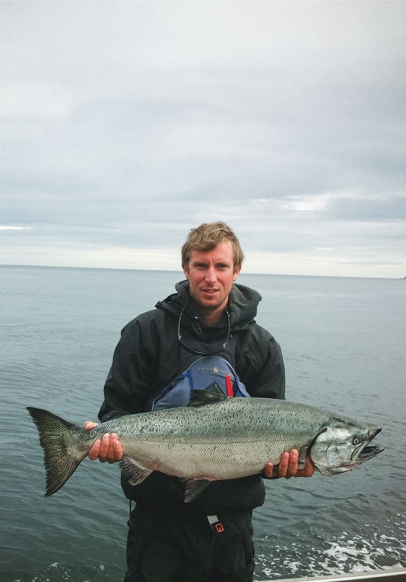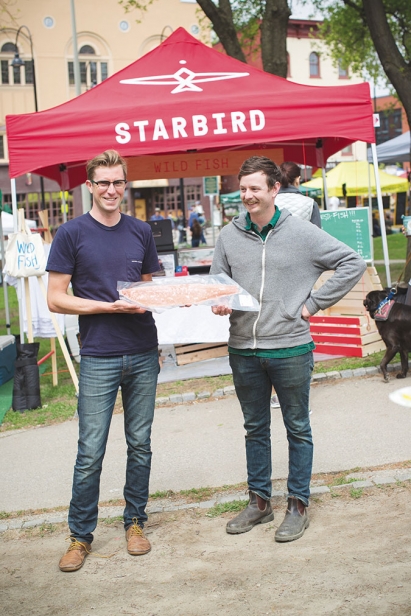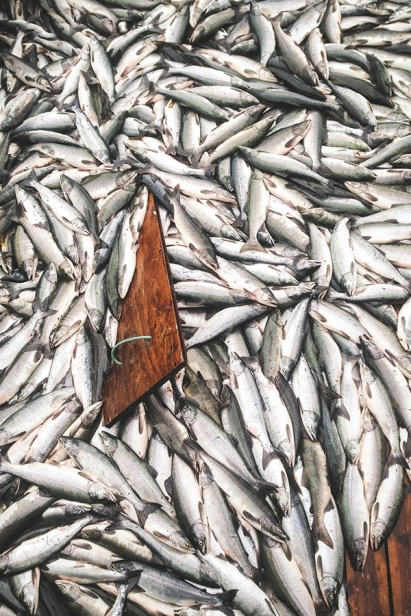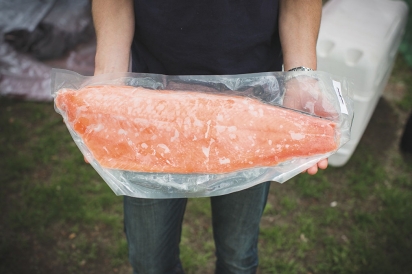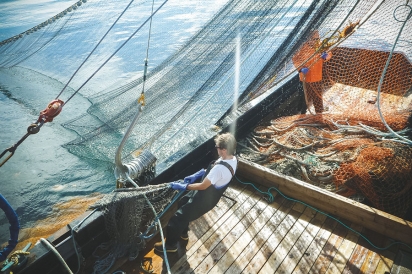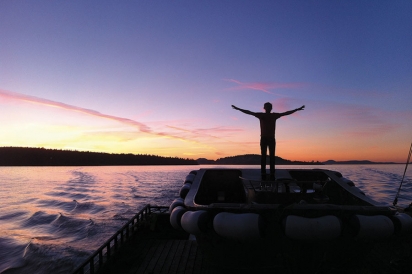Starbird Fish
Through all the world, men follow fish in their seasons,” wrote A.J. McClane, executive editor of Field & Stream.
From the third-story deck of his Burlington apartment, Anthony Naples can look across the shimmering expanse of Lake Champlain to the rugged High Peaks of the Adirondacks. The view bears a striking similarity to his summer home, Alaska’s spectacular Bristol Bay.
Anthony has spent the past 10 summers fishing Bristol Bay, north of the Aleutian Islands in the Bering Sea, and the waters of southeast Alaska. The last four seasons, he captained a commercial fishing boat he helped build, a 70-ton steel workhorse that runs 58 feet in length and has a capacity for 140,000 pounds of fish. Anthony first learned the art of boat building on the coast of Maine with a legend named Lyford Stanley who also taught him navigation. He expanded that knowledge by heading to the Pacific Northwest to work alongside Ray Wadsworth and Ron Warren, famed in the industry for building nontraditional vessels. Between those two Oregon masters, they built nearly 50 boats, many of which have been featured on Deadliest Catch.
CONNECTING VERMONT AND ALASKA
Anthony fishes for wild salmon (king, sockeye, coho), halibut, rockfish, cod. But what distinguishes his business is that he ships a portion of his catch back here to markets he has developed in north central Vermont, while the bulk gets exported to Asian and foreign markets. Sustainably harvested wild seafood, flash frozen at the Alaskan cannery that processes his fish, is now available to denizens of the beloved Green Mountains where Anthony grew up.
He smokes and stores some of the salmon at a facility in Burlington, and the rest of the frozen fish is warehoused at the Mad River Food Hub in Waitsfield. The smoked salmon has hints of Vermont maple syrup, garlic and chipotle, and its meaty flake offers a welcome alternative to thin-sliced smoked salmon. Look for Starbird Fish products at the Saturday Burlington Farmers’ Market, the Village Markets in Waterbury, Richmond and Johnson, as well as through Jericho Settlers Farm, Pete’s Greens and the Intervale.
“These markets have helped increase business significantly,” says Anthony. “Landing a spot at the Burlington Farmers’ Market will give us incredible exposure. Tristan Baribeau, my right-hand man at Starbird Fish, is taking the year off from fishing and will oversee the Burlington Market booth this summer while I’m at sea.” Anthony and Tristan met through the Burlington music scene, and music remains vital to all aspects of Starbird Fish. Tristan spent the last two summers as second-in-command on Anthony’s boats, so he has firsthand knowledge of the product and the process.
A TYPICAL DAY AT SEA
From mid-June through September, Captain Anthony exists on about three or four hours of sleep each night. Running a commercial fishing boat places extraordinary demands on the captain: constant worries about the vessel, the crew, the weather, the catch. Deadliest Catch shows the very real dangers that confront modern commercial fishermen on Alaska’s most challenging seas as they work through physical and mental exhaustion. Anthony takes rightful pride that he has never had a crew member injured, a reflection of his attentive leadership.
Anthony’s crew often comes with little to no commercial fishing experience. “I assemble crews that I can live with. If I get people with the right attitude, I can teach them the skills they need such as basic navigation, boat mechanics, fishing. They just need to demonstrate a willingness to learn and have a general sense of responsibility. We’re stuck in a confined space 24/7 for several months, so it’s most important that we get along well. A weak crew member is a liability for everyone on the boat.”
Success is shaped by a captain’s understanding of marine life and his ability to maintain a sound vessel, dependable gear and a reliable crew. Additional support comes from satellite phone communication and scrambled radio frequency, and single-prop spotter planes that fly overhead scanning the water for schools of jumping salmon.
A typical day for Captain Anthony goes like this. Wake at 3:30 am, turn on the navigational systems, get a mug of something hot then study the charts and plot the day’s course. Once the plan is set, wake the crew and start the diesel engines. While those warm, pull the pick (raise the anchor) and head out to the day’s fishing grounds.
Among the many codes of conduct among fishermen: Whichever boat first drops anchor in a cove for the night is entitled to the first set (dropping of the net) in the morning. Schools of fish build up overnight and then disperse to seek food as day breaks. The goal is to drop the quarter-mile-long net and encircle as many fish as possible. The first set of the day therefore assures the most abundant catch.
The Fish and Game Department determines the exact time boats can start fishing each day. The gun usually goes off around 5am. However, according to Anthony, “Gentlemanly conduct disappears pretty quickly when men see massive amounts of fish and so much money is at stake. There’s a lot of trash talking between boats over the radio.”
The scene immediately turns cutthroat as the fleet of competing boats jockey for position, risking their lives for that crucial first set of the day. And this battle happens every day for as long as the season runs, from late June through August.
Anthony and his crew work flat out for the next 16 hours. They fish all day, which means dropping, hauling and resetting the nets 12 to 15 times throughout the day. Each set takes time and physical energy, and after each haul, they have to carefully refold and prepare the net for its next set. “It’s easy to get psyched when we pull in a huge load,” says Anthony, “but it can be pretty demoralizing when the net comes in with only a couple hundred pounds, as opposed to 40,000 pounds.” During the day, the crew also mends nets and maintains the boat’s mechanical systems.
So the men fish till dark then head to a tender which drops a huge vacuum hose into their boat’s hold and sucks all the fish out. There’s usually a line of other boats waiting at the tender, so the whole process can take a couple of hours. Anthony and his crew generally wrap up around midnight, head to a sheltered cove, drop the pick and hope for a few hours of sleep.
So why would anyone willingly subject himself to these rigors?
For the chance to stand knee-deep amidst a writhing mass of shimmering silver and black salmon, their taut muscled bodies flapping, twisting and slapping against the deck as they slide into the hold below. The fishermen in their rubber pants and boots drag the net from the sea, and still more powerful fish tumble onto the deck. “Nothing surpasses that feeling of ecstasy,” explains Anthony. “It’s everything we’ve worked for!”
And then there’s the pristine beauty. “I get to work in the most beautiful place in the world. My office is between glaciers!” Mountainsides covered in a dense blanket of spruce plunge into the steel-gray water. Even in summer, snow-capped jagged peaks ripple against the endless sky. Cataracts of glacial melt-off race down granite cliffs. Pods of humpback whales and playful porpoises cavort in the water alongside the boat while stately gray sea lions drift by.
Nature also has a harsh side. “Living on the coast of Maine prepared me for the terrible weather I face in Alaska where it’s 50 degrees in midsummer, and I can see my breath in the cold rain and fog,” says Anthony. Mist swirls and dances on the water while clouds settle in for the long haul on the lush mountains. But then, an occasional clear blue day with unlimited visibility, or a dramatic sunset, breaks the monotony. The muted sky, steely dark water and green-black trees transform into deep blue, sparkling silver, rich emerald.
SCALE BACK AND REFOCUS
And what does an Alaskan fisherman do when he returns to his Vermont home? “I recover! All summer, I dream of being able to sleep without the constant roar of four diesel engines.” Anthony spent the winter in Burlington honing his marketing strategies with a revised website, refreshed logo and new labeling. He also made major changes for the summer ahead.
Rather than fish from April through September as he has done for the past decade, Anthony departed Vermont in mid-June and hopes to be back in the Green Mountains by August, having caught enough fish to see him through the year financially.
The Alaskan fishery is predicting a record season for wild sockeye salmon this summer, a testament to that state’s management practices of this sustainable resource. The salmon season hits peak around July 4. Anthony hopes to meet his catch in one and a half months. He will have one crew member with him on his boat this summer as opposed to the four or five he has carried in previous summers.
“This is a huge gamble, but I knew I had to make a change. I feel reinvigorated.” Anthony says. “The stress of building, maintaining and running my own boats wore me down.”
He will fish in two places: a small fishing community on the Ugashik River in Bristol Bay and again in southeast Alaska. Several of his former crew members now captain boats of their own, and Anthony will serve in an advisory role, while fishing of course, and help them establish best practices based on his own decade of experience. “It will be more fun, being able to both fish and advise, without having the strain of captaining the boat.”
Anthony also has created the Northern Seafood Alliance, which will get underway this year. His mission is to provide consumers access to wild fish and seafood caught by fishermen whom Anthony knows personally. “Half of them are UVM grads!” he laughs. “Cranberry” Bob Lesnikoski of Fletcher, Vermont, has been a great resource for Anthony. “He’s a true jack-of-all-trades and savvy about the food scene. Bob’s a commercial fisherman himself, and he came out to Alaska to crew on one of my boats.” The goal is to offer more diverse products, including the scallops, lobsters and shellfish that Bob catches on the East Coast and all the wild seafood that Anthony and his Alaskan friends bring in.
“The future for small seafood producers is in the artisanal food market,” Anthony explains. “I want to provide high-quality product to restaurants and farmers’ markets, places where people care about the source of their seafood.” He continues, “There’s a lot of junk that’s sold as seafood, as well as misinformation bordering on outright lies about origins and freshness.” For example, Anthony refuses to consume or sell shrimp unless he can verify it has been caught in Maine. “You can go to Costco and buy cheap shrimp for 99 cents a pound, but that shrimp was caught on a boat in a faraway land that employs slave labor.”
REFLECTIONS FROM THE WHEELHOUSE
Salmon are born in rivers and lakes, go out and see the world and then come back. That cycle seems to mirror Anthony Naples’s own path through life.
He went to high school in Moretown and graduated from College of the Atlantic in Bar Harbor, Maine. The college proclaims itself as a place “for idealists with elbow grease, who see the world as a complex, interconnected place, and who want to make [it] a better place.” Prior to boat building and commercial fishing, Anthony worked as a farmer, a design/build craftsman and carpenter, a botanist. He restored lighthouses off the coast of Maine. He’s a photographer, filmmaker and musician. What hasn’t he done?
At 33, Anthony Naples has no regrets. “I’ve learned so much from all my mentors. You can step on a perfect turnkey new boat but not learn anything other than a few knots because everything has been done for you. When I started out, we built the boat in Oregon, 300 miles from the Alaskan sea, launched her unfinished and completed the building and fitting out while we traveled northwest.”
“Helping to build experimental boats with quirky builders has taught me a lot about boats and the industry. As a result, I’ve met so many great people who afforded me access to new fisheries. I could move up the ladder because I was presented with certain opportunities. I tend to take risks that pay off.”
With the eye of an artist, soul of a dreamer and nerves of a gambler, Anthony will keep taking those risks that make the world a little bit better. And tastier, too.


